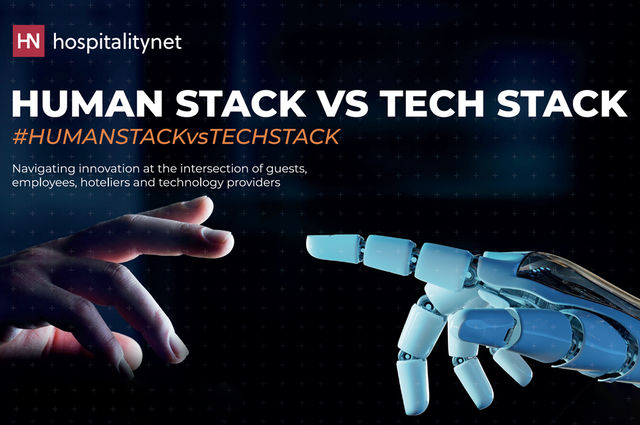HUMAN STACK vs TECH STACK
22 experts shared their view
Balancing tech with the human touch in hotels is key. While tech offers efficiency and digital conveniences like self-booking, mobile check-ins, and AI-enabled services, it can't replace the unique, empathetic service from staff. They provide memorable experiences and connections that tech can't mimic. The goal is to use technology to enable, not replace, human interaction, at the right moment in the guest journey. At the same time, a similar human touch in technology plays an increasingly crucial role in the employee journey, in fields such as staffing, team communication, training, security, personal development, task automation, and finding a better work/life balance.
During HITEC Toronto, we asked the following questions:
- Q1 - Due to tech advancements, hotels will employ 50% fewer desk workers in 2030 - Should hotel employees be worried about being replaced by new tech?
- Q2 - Hotel tech should be part of a strategy to attract new talent to the industry - Does cutting-edge technology enhance and enrich the employee journey?
- Q3 - Hotels should be able to deliver a better guest experience with fewer staff - Does technology make good on the promise of increased guest satisfaction AND profitability, while optimizing staff efficiency?
- Q4 - Today's human stack in hotels is not ready for the upcoming new tech stack - Should organization structures and operational processes be reviewed before thinking of tech revamps?
Due to tech advancements, hotels will employ 50% fewer desk workers in 2030 – Should hotel employees be worried about being replaced by new tech?
In general, technology is most useful when it functions alongside workers who can be on-site to provide a “human touch.” There are still many customers who still place an emphasis on in-person services and prefer to come into a hotel and check in with a receptionist. Other guests may prefer to do it all on their phones and simply pick up their key, but even they would prefer to have a real human nearby in case they run into any errors or have questions throughout the process. The best way to employ technology is as a means of providing as many choices as possible and allowing each guest to choose what best serves their needs.
Related article by Laura Calin
Q1 - Due to tech advancements, hotels will employ 50% fewer desk workers in 2030 -Should hotel employees be worried about being replaced by new tech?
Depending on the sector, the current evidence is, yes. Not because it should be this way, but the trending disposition is to remove staff and increase tech, while convincing the customer that this is what they want/need from the hospitality industry. As compared to the more enlightened hospitality-forward approach whereby Increasing tech to increase hospitality, grow revenue, and improve the service experience.
Related article by Mark Fancourt
In my book on the subject (Hotel Distribution, 2050 - https://www.amazon.it/Distribution-visioni-marketing-distribuzione-alberghiera/dp/882039636X/), I coined the term "Post-Human Hospitality" in an effort to dismantle this anthropocentric preconception (Man Vs. Machine) within our industry. I hoped to assist the reader in better understanding and embracing technological advancements, which are the foundation of a new post-human industry (and let it be clear, not in any way ANTI-human). Thanks to these advancements, hoteliers can finally be freed from complex and non-scalable tasks, allowing them to return to the essence of their profession: taking care of their guests. In the book, I outline a formula that I believe encapsulates my perspective on the matter:
If a machine can fulfill the role of a human employee without the customer perceiving a diminished experience due to this substitution, then the machine is preferable to the human for that specific position.Consider the checkout counter at a supermarket: what added value does a human cashier truly provide to our purchasing experience, especially if their role is limited to scanning the barcodes of our items? Does the presence of a person behind the counter really make a difference? In most cases, no, except for exceptional situations (an extremely friendly cashier, problem-solving skills, etc.). In all other cases, allocating human resources to areas where their strengths can shine would undoubtedly make more sense.
Well, here you have it. The same goes for hospitality.























